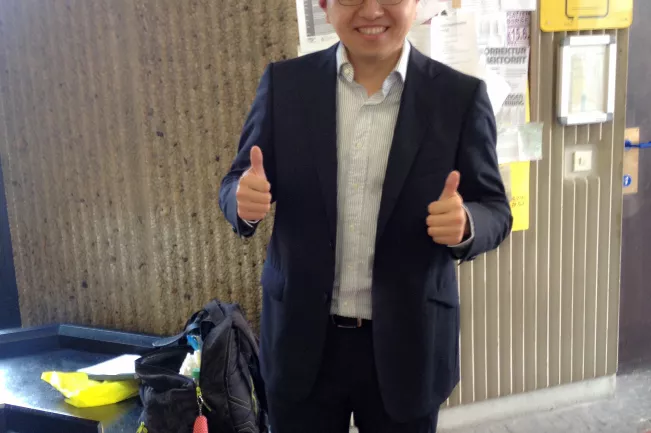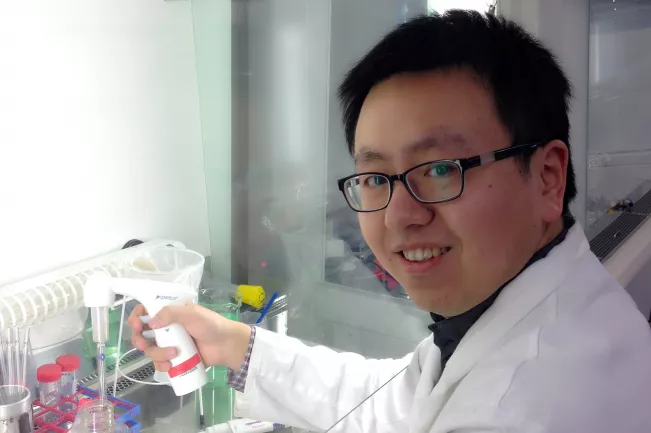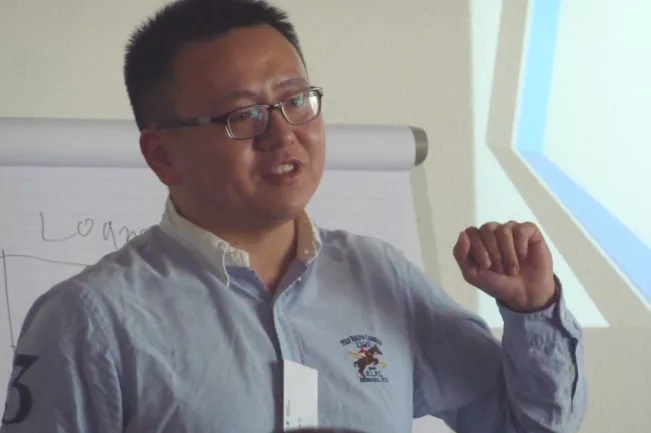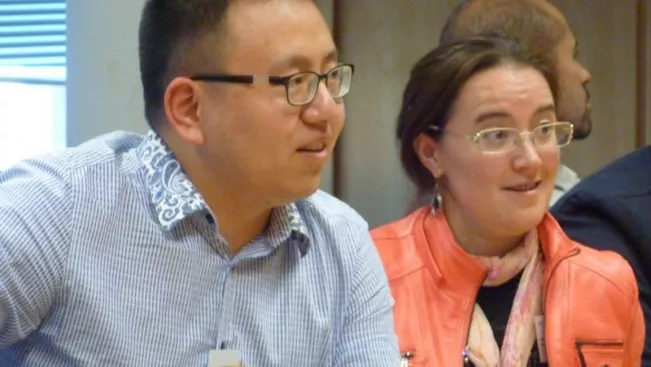Communications and Marketing
Yu Zhang, PhD in Biology
He tells us why he no longer dislikes sparkling water and how he feels about the biggest experiment of all: his life in Germany.

Zhang knew he wanted to go abroad to earn a doctorate, after completing his Bachelor in Bioengineering and his master in Biomedical Engineering from Beihang University in Beijing. His decision to come to Germany to study at H-BRS was made after attending the SpaceLife Summer School which is organized by the German Aerospace Center DLR for which H-BRS, with Prof. Tobiasch, is an associated partner: “Therefore, I chose the opportunity to work in Prof. Tobiasch’s lab at H-BRS. At the beginning, I was a little worried about if I could finish my PhD in Germany, everybody knows it is pretty hard to get in Germany. However, after getting familiar with our team and receiving a lot of help and support from them, my worries were gone. H-BRS has a very small campus so it is difficult to get lost,” he smiles. “I really appreciate the kind help from H-BRS, including our lab group, colleagues from natural sciences department, the Graduate Institute and International Office as well as Alumni Management."

Is it all about a process of habituation?
H-BRS’ labs were different from what he was used to in China: “People always say that Germans like making rules and putting everything in an order. which I was a little disdained at the beginning. However, I realized more benefits when I really kept to it. I have taken a lot of standard operation procedures, lab rules and how to make things in order during my studies. I learned making plans and doing things systematically. This really helps me to plan experiments more carefully and logistically and I still get benefits in my new job.” Zhang explains further: “The biggest differences between working in Germany and China is: in Germany, everything is settled well in advance and put in a schedule; in China, it is not so organized but much easier to make the decision and the execution is fast. I think it will be better to integrate somehow from both sides.” With a smile, Zhang compares adapting to the academic working style to his relationship with sparkling water: “It is similar with the sparkling water which I disliked because we don’t drink it in China, but after five years in Germany, I not only get used to it, I drink it every day now.”
Zhang is also thankful to what he has learnt from his supervisor: “The first notable experience that I have is the passion for research. My supervisor Prof. Tobiasch is a model for devoting herself into stem cell research. Every working day, when I left the lab, I usually saw her office light was on. She even took some of her holidays in writing grant proposals, modifying our papers and reviewing journal manuscripts.” As a research member in Professor Tobiasch’s lab for Generic Engineering and Cell Culture, Zhang was also mentoring students from the U.S., Canada and the U.K. who worked in the lab during summer in the context of Research Internships in Science and Engineering, a programme relalised through DAAD.

A strong team by your side
His life in Bonn also included enjoying cultural events such as the Christmas Market, Carnival celebrations, the Rhine fire night, the Chinese Spring Festival and much more. Zhang also joined the Chinese Basketball team every week. One of the lab excursions, organized by H-BRS, Zhang recalls as if it were yesterday: “With the whole lab team we went on an excursion to a castle near the Rhine river. That was my second day in Germany. We drove in a car, just several meters away from the river, and the view is terrific. We dropped by a castle and had dinner together. To be honest, I was a little bit nervous at the beginning, because I didn’t know all members in advance, but for only several emails with Prof. Tobiasch. However, I felt lucky and comfortable after that day. Since that time, we worked, discussed, and celebrated together in the next five years. Now we have become very good friends and keep in touch with each other.”
Another event, that is not only memorable for Zhang, is the award ceremony for Best Doctoral Graduate Award, which is one of many awards Zhang won for his outstanding performance: “I received the very first PhD thesis award of H-BRS from President Hartmut Ihne. It is the best gift for my five-year research and study in Germany, and I truly thank the whole H-BRS for supporting me. And I still remember my supervisor Prof. Tobiasch’s words on that day: Yu, whenever and wherever you are, if you need my help, please contact me and keep in touch. A reunion was already enabled during the first International Alumni Conference at H-BRS in September 2015, where possible future projects were discussed.

Curiosity is the key
“H-BRS means comfort, warmth and joy in my heart. Now I am working as the president assistant in the biggest cell and gene engineering stock company in China. Every day I have to deal with more than 30 business calls, and most work is in a sudden moment. On the other hand, we do not have so much time to talk to each other and the interpersonal relationship is more complicated in the company. I miss the life in H-BRS, which is more in the schedule and easier in personal relations.”
For current and future students, Zhang has a few suggestions to give along their own exciting path. One should try to enjoy their study time the fullest: “It is the best time to learn something in a systematic way. You won’t find such a time after you go to a company. Don’t think something is not useful at the moment. I had the same feeling when I studied some subjects which I was not so interested in, but I insisted on continuing to learn, and now suddenly I feel it is useful and regret that I should have learned more before,” and “keep your curiosity. It is important to be curious in your study and in the future when you work in the company (...) I learned that the opportunity arrives for those who prepare well and the success is given only to those who have put in his/her effort. Now I am trying to put my passion in my current job and work hard.” Zhang has proven himself that staying curious and working hard can not only open many doors but keep them open.
Yu Zhang about his time at H-BRS

text written by Marion Ender, graduate assistant and student of the International Media Studies programme at H-BRS in collaboation with the university of Bonn and Deutsche Welle Akademie.